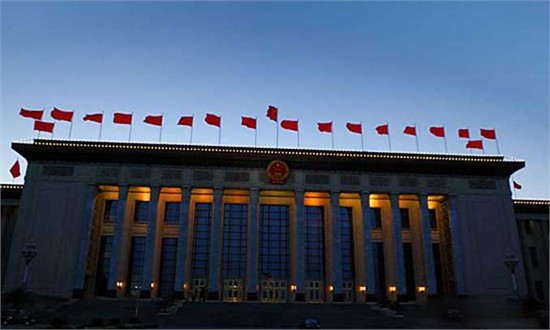
Great Hall of the People. File photo: people.com.cn
Seventeen provincial leaders will attend this year's two sessions in Beijing as they take on their new posts, after the latest round of provincial-level reshuffling which highlighted the promotion of younger, better educated technocrats with extensive grass-roots working experience.
Observers say the new line-up of local officials is a key step to paving the way for a smooth leadership transition in the country expected in the autumn.
In recent weeks, the two sessions - annual meetings of the legislative body and political advisory group - at the municipal, provincial and regional levels concluded across the country, with the provinces of Hebei, Guangdong, Zhejiang, Anhui, Jiangxi, Hainan and Yunnan approving the appointment of their new governors.
Meanwhile, Hebei, Yunnan, Hainan, Gansu and Chongqing approved the appointment of top posts in their legislative bodies, while Hebei, Jiangxi, Yunnan, Qinghai and Guangxi saw new leaders for their political consultative conference.
All of the 17 new cadres were born after the 1950s, and 15 of them hold Masters' degrees or higher, including three with PhDs.
Zhang Qingwei, 50, was transferred to the post of acting governor of Hebei from head of the Commercial Aircraft Corporation of China last summer.
Zhang joined Fujian governor Su Shulin and Hunan Party chief Zhou Qiang, who were also born after the 1960s, to become one of the youngest provincial officials.
Zhu Lijia, a professor at the Chinese Academy of Governance, told the Global Times there is a growing trend of post-60s cadres taking to the stage.
"Among the 397 members of the provincial-, regional- and municipal-level Standing Committee of the Communist Party of China (CPC) across the country, most of them were born in the 1960s, and this group will play a decisive role of pioneers in the country's new round of reform," Zhu said, adding that about 20 percent of these officials hold a doctoral degree, which is not surprising considering China's overall development.
Zhang and Su, who used to head up the State-owned oil giant Sinopec, were both regarded as technocrats, and some observers had suggested their background in running enterprises may help spur local economic growth.
However, Zhu urged these officials to transform their experience in managing large State-owned enterprises into administration.
"It's totally different managing a big firm and society," said Zhu. "Great changes have taken place regarding the social contradictions and the complexities of China, and problems will arise if society is managed in the way a company is managed."
In addition to Zhang and Jiangxi governor Lu Xinshe, who served in the Ministry of Land and Resources for more than 20 years, the five other new governors all had extensive work experience at the local level.
Among them, Guangdong governor Zhu Xiaodan spent the past 41 years working in the province. Zhejiang governor Xia Baolong and Yunnan governor Li Jiheng were promoted to the top provincial post after serving as deputy provincial heads for more than five years.
Li Bin, the only woman among the new governors, was transferred to Anhui in December from the post of the head of the National Population and Family Planning Commission. With a PhD in economics, she became the third female provincial head in the country.
The Southern Metropolis Daily commented that sending officials who used to work within central authorities to serve at the local level would help them accumulate work experience and boost their political careers.
While the transfer of officials from one province to another would help avoid conflicts of interest, the paper noted that the promotion of cadres within the province would give new cadres the opportunity to give full play to their capabilities.
Meanwhile, Zhu Lijia said that the pattern of official appointment is under the management of the Organization Department of the CPC Central Committee, which will not be changed in the short term.
"The whole process should be carried out with a high level of transparency, mass participation and democracy," Zhu said.
Separately, 24 provinces and autonomous regions see their Party chiefs hold the posts of top provincial and regional legislator at the same time.
Also Monday, the Standing Committee of the National People's Congress (NPC) began its bi-monthly session to review draft laws and prepare for the NPC's annual full session scheduled to begin on March 5.
On the agenda, legislators will continue reading a draft amendment to the Law on the Promotion of Clean Production, start the deliberation of a draft law on assets appraisal and review a report on whether it is necessary to amend two annexes to the Basic Law of the Macao Special Administrative Region.

Copyright ©1999-2011 Chinanews.com. All rights reserved.
Reproduction in whole or in part without permission is prohibited.